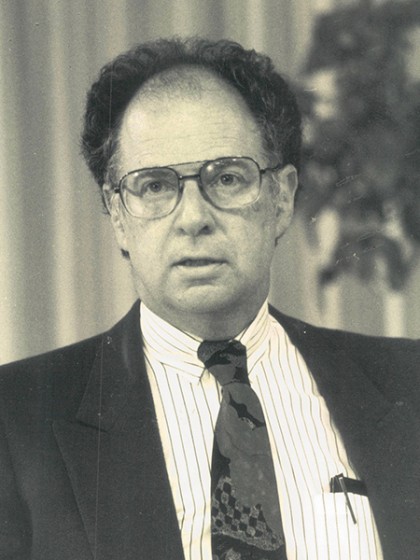Philip D. Zieve, an esteemed physician and a longtime leader at Johns Hopkins Medicine, has died. He was 84.
Zieve was a professor of medicine at the Johns Hopkins University School of Medicine, the former director of the Department of Medicine, and vice president of medical affairs and chief of the professional medical staff at Johns Hopkins Bayview Medical Center.

Image caption: Philip D. Zieve
"Though Phil achieved many outstanding milestones in his more than 50-year career here, his legacy will be helping to turn around the ailing Baltimore City Hospitals to its present-day success as Johns Hopkins Bayview Medical Center," wrote Paul B. Rothman, dean of the medical faculty and CEO of Johns Hopkins Medicine, and Ronald R. Peterson, president of the Johns Hopkins Health System and executive vice president of Johns Hopkins Medicine, in an email to the Johns Hopkins community. "In many respects, Phil gets the credit for bequeathing BCH to Johns Hopkins."
Zieve was a respected instructor, and trained many leaders in medicine, some of whom have assumed prominent roles within Johns Hopkins Medicine, including Richard Bennett, president of Johns Hopkins Bayview; Roy Ziegelstein, vice dean for education for the school of medicine; Nisha Chandra-Strobos, chief of cardiology for Johns Hopkins Bayview; and Steven Kravet, president of Johns Hopkins Community Physicians.
He played a key role in advancing clinical, research, and educational programs, and the physical redevelopment of what is today Johns Hopkins Bayview. By 1980, Baltimore Mayor William Donald Schaefer was exploring a process for enabling the city to divest its time-honored responsibility for the ownership and management of the public hospital. Zieve and his colleague Chester Schmidt persuaded then-president of Johns Hopkins Hospital, Robert Heyssel, that Johns Hopkins should become actively involved in the future of BCH. In 1982, under a contract with the city, Johns Hopkins assumed management of BCH. Only two years later, in 1984, Johns Hopkins acquired BCH and renamed it the Francis Scott Key Medical Center.
Also see
Zieve graduated from Baltimore City College, a public high school, in 1950, and from Franklin & Marshall College in 1954. In 1958, he graduated from the University of Maryland School of Medicine. He came to BCH as a resident that same year doing rotations in obstetrics and chronic medicine. From 1964 to 1973, Zieve was chief of the Division of Hematology at BCH and became an internationally recognized hematologist. He helped to found Chesapeake Physicians Professional Association (CPPA), which became a national model for faculty practice plans in academic medical centers. In 1973, he was named director of the Department of Medicine at BCH.
In 1997, he became vice president of medical affairs, a position he held until 2003. Until several years ago, Zieve was a physician adviser for the Institutional Review Board at Johns Hopkins Bayview. He was also part of the first board of trustees in 1984 and remained trustee emeritus until the time of his death.
Zieve was an extensive researcher, publishing more than 100 professional books, journal articles, book chapters and abstracts. Most noteworthy, he published seminal research in the 1960s with Johns Hopkins hematology legend C. Lockard Conley. The medical service at Johns Hopkins Bayview is named in Zieve's honor to recognize his decades of service to the medical center and for advancing patient care.
Zieve is survived by his wife, Elaine Zieve (nee Wishnie); his daughters, Melissa, Karyn and Allison; and his nine grandchildren.
A memorial service for Zieve will be planned in the coming months, to be held at Johns Hopkins Bayview. Donations in his memory may be sent to Johns Hopkins Bayview Medical Center, Development Office, 5200 Eastern Ave., MFL Center Tower, Suite 359, Baltimore, MD 21224.
Posted in Health
Tagged johns hopkins hospital, johns hopkins medicine, obituaries







